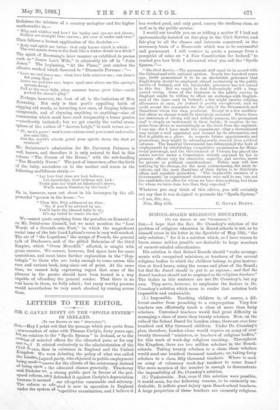SCHOOL-BOARD RELIGIOUS EDUCATION.
[TO TRH EDITOR OF THE "SPECTATOR:1
Six,—I hope that the Rev. Dr. Crosskey's solution of the problem of religious education in Board-schools is not, as he himself avers in his letter in the Spectator of May 13th, "the only solution;" for it is a solution which, as I have reason to know, seems neither possible nor desirable to large numbers of earnest-minded educationists.
His solution is that School Boards should "make arrange- ments with recognised ministers, or teachers, of the several religious bodies to which the children belong, to give instruc- tion at fixed hours, using the rooms and plant of the Board ; but that the Board should be put to no expense; and that the Board teachers should not be employed as the religious teachers." The italics in. this sentence are not Dr. Crosskey's, but my own. They serve, however, to emphasise the factors in Dr. Crosskey's solution which seem to render that solution both impossible and undesirable.
(I.) Impossible. Teaching children is, of course, a dif- ferent matter from preaching to a congregation. Very few teachers can effectually teach a class of more than forty scholars. Untrained teachers would find great difficulty in managing a class of more than twenty scholars. Now, on the rolls of the School Board for London alone, there are over four hundred and fifty thousand children. Under Dr. Crosskey's plan, therefore, London alone would require an army of over twenty thousand "ministers, or teachers of religious bodies," for this work of week-day religious teaching. Throughout the Kingdom, there are two million scholars in the Board- schools. Taking twenty scholars to a class, these scholars would need one hundred thousand teachers ; or, taking forty scholars to a class, fifty thousand teachers. Where is such an army of voluntary week-day teachers to come from? The mere mention of the number is enough to demonstrate the impossibility of Dr. Crosskey's solution. (2.) Undesirable. But, even if this solution were possible, it would seem, for the following reasons, to be eminently un- desirable. It inflicts great injury upon Board-school teachers. A large proportion of these teachers are earnestly religious. Yet Dr. Crosskey's plan would prevent these teachers from taking any part in the religious instruction of their pupils. Many of the teachers lay the greatest stress upon the religious lesson ; they value it above every other part of their work ; it gives to their work its highest and noblest importance. To deprive them of the opportunity of giving religious instruc- tion would be to deprive them of their chief opportunity of doing good, and would pilfer from the crown of their profes- sion its brightest jewel.
Moreover, Dr. Crosskey's plan inflicts great injury upon children. To the children of every good school, the teacher is not only the symbol of authority and a standard of the relative importance of things, but also an object of great affection and trust. Next to the parent, the day-school teacher is the most important fact in the lives of great multitudes of children ; and fills the largest space in their opinion of things. To take the religious instruction out of the hands of the day-school teachers would, therefore, be to rob that instruction of the authority and importance which no one, except a parent, can so well impart to it. To take the religious instruotion out of the hands of the day-school teachers would inevitably result in the depreciation of the value of that instruction by the children; and whatever even tends to depreciate the value of religion in the minds of children, inflicts on them a life-long injury.
Then, again, to take the religious instruction out of the hands of trained teachers, and to put it into the hands of preachers or teachers untrained, is to put religious instruction to a most serious disadvantage. Even if preachers and ministers of religion were good teachers of children (which frequently they are not), yet their time and strength is already fully taxed, and such attention as they could give to the new work which Dr. Crosskey proposes to lay upon them would be altogether inadequate to its efficient discharge. Besides, under Dr. Crosskey's plan, the religious teaching would not be an integral part of the curriculum of the school-work. It would be done by outsiders in hours outside school-hours. Attendance would be optional, and just the very class of children who most need religious instruction—children from evil homes, whose parents would take no pains to secure their children's attendance—would be most irregular in their attendance, or would not attend at all.
For these, and many similar reasons, Dr. Crosskey's solu- tion of the problem of religious teaching in Board-schools seems eminently undesirable. No doubt some difficulties sur- round every solution yet attempted ; but the solution which would exclude Board teachers from taking any share in the religious instruction at Board-schools, seems, of all solutions, the solution most injurious to the great cause of the religions training of the young,—a cause which, I am persuaded, Dr. Crosskey has at heart no less than,—Yours, &c., JOHN W. DIGGLE, Vicar of Moseley Hill, May 17th. Hon. Canon of Liverpool.



































 Previous page
Previous page